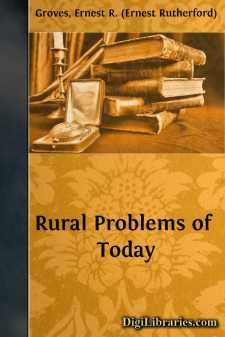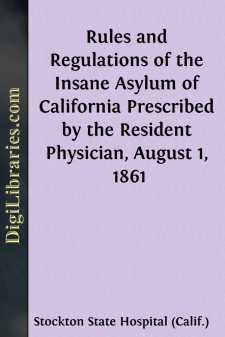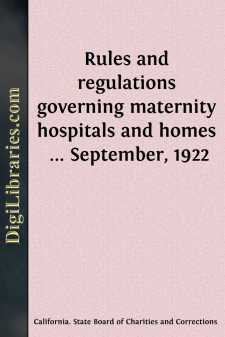Non-Classifiable
- Non-Classifiable 1768
Non-Classifiable Books
Sort by:
SANDWICHES Sandwiches may be made from one of three or four kinds of bread; whole wheat bread, Boston brown or oatmeal bread, white bread and rye bread made into square, deep loaves; in fact, all bread used for sandwiches should be made especially for the purpose, so that the slices may be in good form, and sufficiently large to cut into fancy shapes. The butter may be used plain, slightly softened or...
more...
by:
J. W. Byers
What is Sanctification? Scripturally, the word sanctification has three meanings: First, separation; second, dedication; third, spirit-filling. Webster's definition of it is as follows: "1. Sanctification is the act of God's grace by which the affections of man are purified, or alienated from sin and the world, and exalted to a supreme love of God; also, the state of being thus purified...
more...
by:
Louis Bertrand
PROLOGUE Inquietum est cor nostrum donec requiescat in te. "Our heart finds no rest until it rests in Thee." Confessions, I, i. Saint Augustin is now little more than a celebrated name. Outside of learned or theological circles people no longer read him. Such is true renown: we admire the saints, as we do great men, on trust. Even his Confessions are generally spoken of only from...
more...
I.—INTRODUCTION. At present marriage is easily the most dangerous of all our social institutions. This is partly due to the colossal ignorance of the public in regard to sex, and partly due to the fact that marriage is mainly controlled by lawyers and priests instead of by women and doctors. The legal and religious aspects of marriage are not the primary ones. A marriage may be legal—and miserable;...
more...
by:
Esther Singleton
PRINCE KROPOTKINE The Russian Empire is a very extensive territory in eastern Europe and northern Asia, with an area exceeding 8,500,000 square miles, or one-sixth of the land surface of the globe (one twenty-third of its whole superficies). It is, however, but thinly peopled on the average, including only one-fourteenth of the inhabitants of the earth. It is almost entirely confined to the cold and...
more...
THE RURAL WORKER AND THE COUNTRY HOME With reference to the care of children, faulty homes may be divided into two classes. There are homes that give the children too little care and there are homes that give them too much. The failure of the first type of home is obvious. Children need a great deal of wise, patient, and kindly care. Even the lower animals require, when domesticated, considerable care...
more...
by:
Joseph Kennedy
RURAL LIFE It is only within the past decade that rural life and the rural school have been recognized as genuine problems for the consideration of the American people. Not many years ago, a president of the United States, acting upon his own initiative, appointed a Rural School Commission to investigate country life and to suggest a solution for some of its problems. That Commission itself and its...
more...
PREFACE The following pages represent an attempt to put before the rural population a systematic treatment of those special subjects included in what is popularly known as Hygiene as well as those broader subjects that concern the general health of the community at large. Usually the term "hygiene" has been limited in its application to a study of the health of the individual, and treatises on...
more...
RESIDENT PHYSICIAN. The Resident Physician, who shall also be the Superintendent, shall be the chief executive officer of the Asylum; he shall have the general superintendence of the buildings, grounds, and property, subject to the laws and regulations of the Trustees; he shall have the sole control and management of the patients; he shall ascertain their condition, daily prescribe their treatment, and...
more...
CHAPTER 69, STATUTES 1913. An act to provide for the licensing, inspecting and regulating of maternity hospitals or lying-in asylums, and institutions, boarding houses and homes for the reception and care of children, by the state board of charities and corrections, and providing a penalty for the violation of the provisions of this act. [Approved April 23, 1913. In effect August 10, 1913.] The people...
more...











